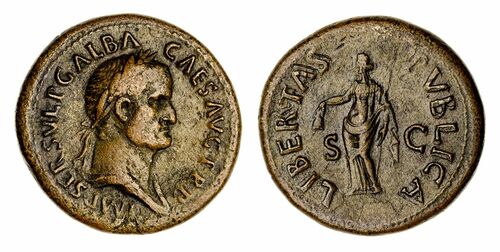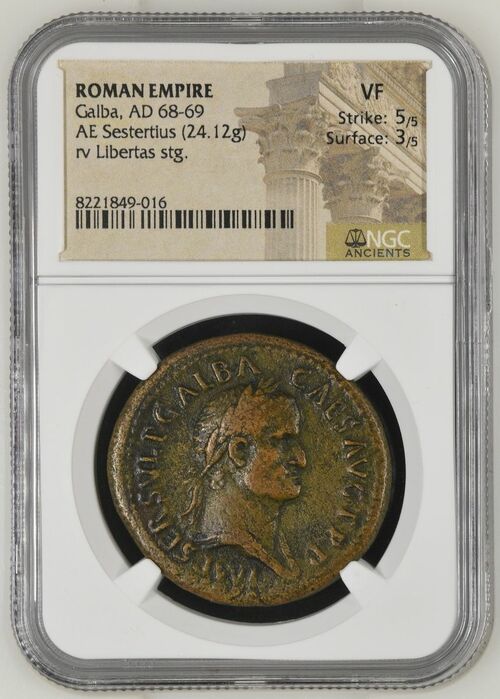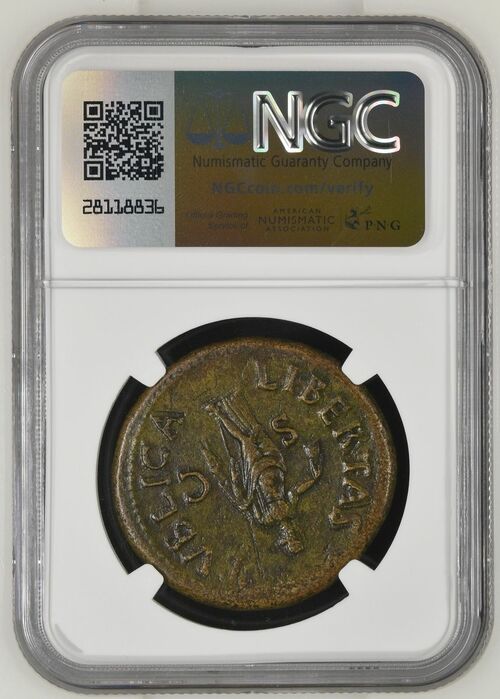Auction: 24005 - The Official Coinex Auction of Ancient, British and World Coins
Lot: 115
NGC VF | Roman Empire, Galba (AD 68-69) AE Sestertius, IMP SER SVLP GALBA CAES AVG TR P, laureate and draped bust right, rev. LIBERTAS PVBLICA, Libertas standing left, holding sceptre and pileus, S-C across fields, 24.12g (RIC 309; Cohen 130), fine portrait capturing the stern austerity of this stubborn and disappointing emperor, lovely patina, good very fine, in an NGC 'Ancients' holder, graded Very Fine (Strike: 5/5, Surface: 3/5) [NGC Cert. #8221849-016]
Provenance
The Major Hamish and Mrs Ann Orr-Ewing Collection of Roman Coins
Servius Sulpicius Galba would have seemed, by all accounts, to be an ideal candidate for the imperial title. He was of a distinguished noble pedigree and his long career, which had spanned military and proconsular appointments in Gaul, Africa, Germany and finally the governorship of Hispania Tarraconesis, won him plaudits from Augustus, Caligula, Tiberius and Claudius for his capability and discipline. He was so close to the Julio-Claudians that Livia, the mother of Tiberius and the first Augusta, had bequeathed him a huge fortune in her will, although the bitter Tiberius had nullified the inheritance and seized the funds. Nevertheless, Galba possessed already a huge fortune and remained loyal to the regime. Such was his reputation for probity and administrative and military skill, that he was considered an ideal candidate to succeed Caligula in 41 until Claudius acceded the throne. He would have to wait nearly three decades, until the Gallic revolt of Julius Vindex provided an opportunity for him to launch a revolt from Spain.
Galba's short and tumultuous reign, nearly all of which was taken up by his journey from Hispania to Rome, oversaw a sophisticated and diverse coinage remarkable for its variety and complexity. In producing this coinage, Galba was attempting to draw links to the Julio-Claudians, while emphasising the restoration of Roman liberty and provincial freedom which had been trampled by Nero. It was under Galba that, for the first time, 'Augustus' and 'Caesar', which had been personal family names for every member of the Julio-Claudian dynasty, were repackaged as official titles. His exaltation of liberty, as found on the reverse of this present example, and various provincial personifications, likewise accentuated his role as a moral traditionalist, who would nurture the freedoms owed to the Roman people, rather than stifle them.
However, Galba had none of the political instincts or shrewd flexibility required for an emperor in the post-Augustan world, and in actuality, his regime was one of fiscal penury and shortsighted stubbornness. Galba owed his accession to two factors: firstly, the revolt of Vindex, which had destabilised Nero's regime and given him access to a fleet, and secondly the support of the Praetorian Guard, whose own prefect, Nymphidius, had promised the Praetorians gargantuan bribes for their support of Galba.
In the first instance, Vindex was defeated and killed by the legions of lower Germania, ostensibly loyal to Nero, who had been led to put down the revolt by the capable and loyal general Rufus Verginnius. The latter had refused calls from his men to push for an imperial claim, however Galba, viewing Rufus as a potential threat at the head of the sizeable force in Upper Germania, removed him from his command. Meanwhile, he gave the command of the legions in Lower Germania to the dull and unimpressive Aulus Vitellius. As it turned out, Vitellius's lack of qualities made him an ideal figurehead for the mutinous German legions, and his own revolt, which he launched on New Year's Day of 69, contributed heavily to Galba's collapse. This was exacerbated by the fact that these same legions recalled the misery of being under the command of the notoriously brutal disciplinarian Galba during his own Germanic command some years previously. In the second instance, Galba had made it very clear on his approach to Rome that he would not be honouring any of Nymphidius's promises of imperial largesse to the Praetorians. This meant that with the German legions in outright revolt, the imperial guard would only require a candidate with slightly more willingness to bribe them to take the same step. Indeed, Tacitus suggests that even an act of 'token generosity' would have placated the Praetorians, but no such goodwill was forthcoming from Galba.
When Galba's ambitious supporter, Marcus Salvius Otho, was snubbed as a potential successor in favour of Lucius Calpurnius Piso Frugi Licinianus, Otho began to hand out bribes to various members of Galban regime. With the threat of a coup from the German legions, the Praetorians turned against Galba, charging into the crowds and towards his imperial sedan as he made his way through the streets of Rome. His personal bodyguards soon abandoned him, and the elderly usurper was flung to the ground, before being hacked to death, decapitated and his body dragged through the streets before being flung into the Tiber. Otho was proclaimed emperor that day, and assembled a force to try and halt the impending invasion of Vitellius.
Subject to 20% VAT on Buyer’s Premium. For more information please view Terms and Conditions for Buyers.
Sold for
£650
Starting price
£650









